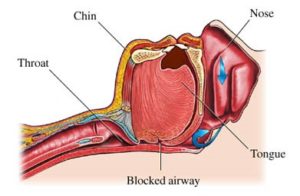Obstructive Sleep Apnea
Trying to understand exactly what obstructive sleep apnea is can be somewhat confusing. It is not just as simple as struggling to breathe now and again when sleeping. It is a serious medical condition, and far more common than most people realize. Obstructive sleep apnea is the most common form of sleep apnea and is usually evident in people who snore during sleep. Here is what you should know about this condition.
1. What Is Obstructive Sleep Apnea?
When your throat randomly closes or collapses during sleep, and it becomes difficult to breathe, you are likely suffering from obstructive sleep apnea. Most people who have this happen also exhibit snoring whenever they try to sleep. While it can affect anyone at any age, it tends to affect overweight individuals, and those who are middle aged or older. Obstructive sleep apnea typically requires a sleep study to diagnose, and then treatment follows after a diagnosis is complete. Most times, treatment will involve some type of a device that will help hold the throat open during all phases of sleep.
Risks of Undiagnosed Obstructive Sleep Apnea
Because obstructive sleep apnea stops your breathing randomly throughout the night, it can cause you to struggle in all aspects of life when you are awake. Not only is your sleep less effective, but you are also risking the effects of sleep deprivation taking over your life. If your sleep apnea is severe and you stop breathing a lot during each of your sleep cycles, you could end up stopping at one point, and not be able to start breathing again. This medical condition needs to be taken very seriously.
If you think you may have obstructive sleep apnea, you should contact your primary care physician immediately and schedule an appointment. He or she is the only one who can get the process started to get you diagnosed. This process could save your life if your condition is on the serious side, or at the very least offer you better sleep at night, and more wakeful experiences during the day.
2. Obstructive Sleep Apnea—Part Two
Obstructive sleep apnea has many signs and symptoms, and they vary with each person. Some people will exhibit next to no symptoms and have a very mild case, while others will show every single symptom and have a case that could be deadly if left undiagnosed. If you think that you or someone you care about is suffering from obstructive sleep apnea, consider some of these symptoms to determine if that person should be checked out by a medical professional. This medical condition should not be ignored and could be dangerous if it is not diagnosed and treated properly.
The Common Symptoms of Obstructive Sleep Apnea
Some of the most common symptoms when it comes to obstructive sleep apnea include snoring, a headache when you wake up in the morning, someone actually seeing you stopping breathing during your normal sleep cycles, waking up abruptly feeling short of breath, high blood pressure, high levels of distraction and difficulty focusing on mundane daily tasks, irritability, and waking up with a dry or scratchy throat. Each of these symptoms is directly correlated to the stopping of breathing due to the collapse of the throat during sleep.
When Symptoms Get Bad Enough to Get Diagnosed with Obstructive Sleep Apnea
If you are showing some signs of obstructive sleep apnea, then it may be time to go and get diagnosed by a medical professional. If you are not sure if things are bad enough to get checked, ask yourself these questions. Have you woken anyone up with your snoring, including yourself? Do you notice that you randomly stop breathing during sleep, perhaps when you are just starting to doze off? Do you wake up short of breath from right in the middle of a sound sleep? Have you noticed that you are super tired during the day, even when you should have gotten enough sleep the night before? If you answered yes to any or all of these questions, then you should contact your doctor and find out about getting diagnosed with obstructive sleep apnea.
3. Obstructive Sleep Apnea—Part Three
There are numerous risk factors for obstructive sleep apnea. They can come from a person’s age, weight, environment, sleeping position, race, gender, health, and family history. If you are unsure of how at risk you are for obstructive sleep apnea, consider some of these risk factors. For anyone that has a good number of these risk factors, you may want to consider talking to your primary care physician about getting checked for this potentially dangerous diagnosis.
Controllable Risk Factors for Obstructive Sleep Apnea
When it comes to lowering your risk of developing obstructive sleep apnea, you have a few things you can do to help. First of all, if you smoke, stop now. Aside from the miserable list of dangers this habit adds to your body, sleep apnea chances increase exponentially. The same goes for anyone that drinks alcohol, since it relaxes your body. Those who are overweight are at a higher risk to develop obstructive sleep apnea, as are those who tend to sleep on their backs. If you want to decrease your chances, make sure you are sleeping on your side or stomach, keep your body as healthy as possible, and keep dangerous substances out of your body.
Uncontrollable Risk Factors for Obstructive Sleep Apnea
While there are some risk factors you can change or improve to decrease your chances of getting obstructive sleep apnea, some are simply going to remain out of your control. If you happened to be born a male, then your chances of this diagnosis nearly double. Your family history when it comes to sleep apnea is another risk factor you can do nothing about. African American individuals have higher chances of developing obstructive sleep apnea than those of any other decent. Also, the older you get, the more your chances of developing this condition go up.
If you want to avoid developing obstructive sleep apnea, take the time to take care of yourself. While you cannot control each risk factor, you can keep your body healthy. The healthier you are, the lower your chances of facing a diagnosis of obstructive sleep apnea will be.
4. Obstructive Sleep Apnea—Part Four
There are some very common tests that doctors will perform when it comes to diagnosing obstructive sleep apnea. They will need to first ask you a series of questions, and then they will need your permission to perform some testing while you sleep. The more they find during your time at the sleep clinic, the more they will know about the severity of your obstructive sleep apnea diagnosis. Give your doctor all of the help you possibly can if you want them to be able to accurately diagnosis what is going on with your breathing while you sleep.
Questions to Help Diagnose Obstructive Sleep Apnea
Your doctor is going to start asking questions right away when presented with the potential of an obstructive sleep apnea diagnosis. They are going to want to know when you first started showing symptoms, and if there is anything that can be done in your experience that has lessened the symptoms that you were exhibiting. They are also going to need a list of the symptoms that you or those around you have noted that makes you think that sleep apnea may be your condition. They will want you to rate how well you feel you sleep, how refreshed you feel upon getting up in the morning, and an idea about how often you feel exhausted part of the way through the day.
Tests to Help Diagnose Obstructive Sleep Apnea
Once your doctor has an idea of how bad your symptoms are and how long you’ve been having them, they will want to perform a few diagnostic tests to see if you have obstructive sleep apnea. First they will want to run a sleep study. This is when you sleep in a laboratory, being monitored the entire time, so they can keep a close eye on your breathing. Next they will want to monitor how much oxygen is going through your blood while you sleep. Some physicians require you to be monitored during your sleep study, while others have you do this at home. You will have to find out from your doctor which he or she prefers. If they are not able to diagnose you with obstructive sleep apnea during either of these tests, they will often send you home with a monitor to be able to keep an eye on you in your normal environment. Some people just won’t show symptoms while away from their own bed, so your diagnosis may require a different method.
5. Obstructive Sleep Apnea—Part Five

If you have recently been diagnosed with obstructive sleep apnea, you may be trying to figure out the best ways to treat this condition. There are many different methods that can be effective at helping you breathe better and get more restful sleep. Some of the treatments for obstructive sleep apnea include things you can do to or with your body, while others involve machinery and devices to keep your airways as unobstructed as possible.
Bodily Treatments for Obstructive Sleep Apnea
Some of the easiest treatments for mild cases of obstructive sleep apnea are things that you can do yourself. Consider sleeping on your sides or stomach instead of on your back to help keep your airway open. Try losing a little weight if you are slightly overweight, and that may help decrease or stop your symptoms. Quitting smoking and drinking can go a long way in reducing or eliminating the symptoms of obstructive sleep apnea. As can getting regular exercise and adding a nasal decongestant to your nightly routine.
Device Treatment for Obstructive Sleep Apnea
When self-treatment options for obstructive sleep apnea do not completely do the trick, you may want to consider adding some type of a device to your sleep. This can be a small device you place in your mouth to realign your jaw and keep your airway open, or this could be a small suction cup that fastens to your tongue to pull it forward and keep it from obstructing your airway. There are also sleeping masks you can wear that help pressurize your airway, keeping it open while you sleep. The most common is the CPAP machine, but there are more options out there.
When it comes to getting the proper treatment for obstructive sleep apnea, you need to find out what is best for you based on your doctor’s recommendation. They will have a better understanding of what your body needs to help you than you will, so ask all the questions you need when you talk with your doctor at the time of your diagnosis.
